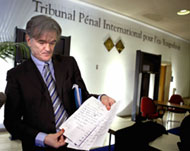UN: Milosevic died of heart failure
Slobodan Milosevic, the former Yugoslav president, died of a heart attack, the UN war crimes court has announced while refusing to rule out a poisoning theory as it prepares his body for release on Monday.

After a day of rumours over the death of the man at the centre of the bloody Balkans conflict, the tribunal in The Hague announced on Sunday that initial autopsy results showed he had died of a myocardial infarction.
Commonly known as a heart attack, this is caused by a blood clot blocking a coronary artery, leading to the death of heart muscle.
A statement said pathologists had identified two heart conditions that he suffered from and which “would explain the myocardial infarction”.
The autopsy was carried out amid reports that Milosevic, who had a history of heart problems, may have been poisoned or taken his own life.
Earlier, quoting “unofficial but reliable sources”, Serbian television’s correspondent in The Hague said pathologists examining Milosevic’s body found the cause of death to be “classical heart failure”.
Toxicology tests
CNN television, quoting sources close to the UN war crimes tribunal, had said Milosevic died of a “massive heart attack”. It said it was not yet sure whether he had died of natural causes but that would become clear after the results of toxicology tests.
The autopsy was carried out amid suspicions that Milosevic was poisoned or took his own life after he was found dead in his cell on Saturday.
|
“It’s odd, although naturally it is possible, that he died unexpectedly without the doctors noticing that his health had suddenly worsened” Carla Del Ponte, |
Milosevic’s entourage – and the ex-president himself in a letter revealed after his death – have charged that he was poisoned, while Carla Del Ponte, the UN war crimes tribunal’s chief prosecutor, said that suicide could not be ruled out.
Del Ponte said it was strange the doctors at the tribunal, who regularly checked the former Yugoslav leader’s health, had not reported a sudden deterioration in his condition.
“It’s odd, although naturally it is possible, that he died unexpectedly without the doctors noticing that his health had suddenly worsened,” she said.
Del Ponte told the Italian newspaper La Repubblica in an interview published on Sunday: “He could have done it as a last act of defiance towards us. Perhaps he did commit suicide.”
Letter to Russia
Zdenko Tomanovic, Milosevic’s legal adviser, revealed that the former Yugoslav president had addressed a letter to the Russian Foreign Ministry saying that he feared he was being poisoned after receiving a medical report indicating large amounts of a drug for tuberculosis or leprosy in his blood.
“Milosevic pointed out that during the last five years he had never used any such antibiotics, especially since he had never had leprosy or tuberculosis or any kind of infectious disease except for the flu,” Tomanovic said.
 |
|
Tomanovic shows a handwritten |
A Serbian pathologist assisted, and two Serbian observers were present at the autopsy.
Dutch television reported late on Sunday that recent analyses had found “foreign substances” in Milosevic’s blood, bolstering suggestions that he did not die of natural causes.
NOS Television said the substances “neutralise the effects of the medications prescribed to Milosevic for his blood pressure and his heart problems, which supports the suggestion that he did not die a natural death”.
NOS said on its website that the tests were carried out in recent months by Dutch doctors who wanted to know why the medications were having no effect.